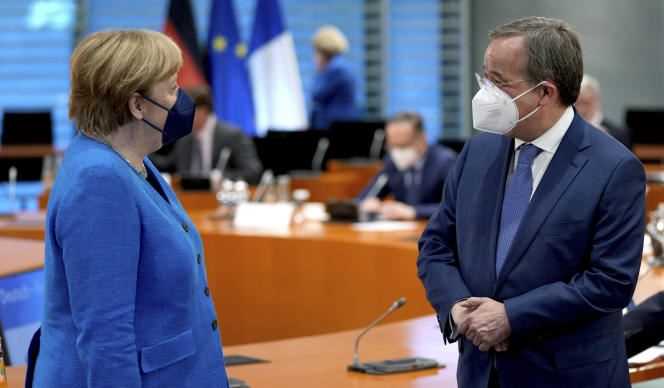“Keine Experimente! “ (“No adventures”), had promised Chancellor Konrad Adenauer (CDU), candidate for his re-election in 1957. Sixty-four years later, the program on which Armin Laschet intends to rely to succeed Angela Merkel at the head of the federal government could be summed up by the same formula.
In line with Adenauer, with whom he shares the Catholic faith and Rhenish origins, the CDU-CSU candidate presents himself as the natural heir of Angela Merkel whose main choices he has approved since coming to power in 2005. Especially during the refugee crisis of 2015, during which he loyally supported his reception policy, in opposition to a number of heavyweights of the conservative right, who strongly opposed it.
In a title, the order of the words, for example, can be as important as the words themselves. This is the case with the “Program for Stability and Renewal” presented on Monday June 21 by the German conservatives. 139 pages long, the project on which the CDU-CSU intends to win the legislative elections of September 26 is more an ode to continuity than a call for change.
At the heart of this program: the refusal of a tax increase. “After the pandemic, tax increases are not the right way to go”, indicates the document. Unlike the Greens, the Social Democrats (SPD) and the left-wing Die Linke party, the conservatives are opposed to the introduction of a wealth tax. Like the Liberal Democrats (FDP), they promise to abolish the solidarity tax created in 1991 to finance the cost of reunification. They are also proposing to reduce the maximum tax on corporate profits from 30% to 25%.
Faithful to its past commitments
As in the past, the CDU-CSU continues to present itself as the guarantor of budgetary orthodoxy. “We want to return as quickly as possible to balanced budgets without new debt and lower the debt ratio of general government below 60%”, can we read in his program presented on Monday. On this point, the conservatives clearly stand out from the Greens, the SPD and Die Linke, who want to reform the “debt brake”. This constitutional mechanism, which since 2009 has prohibited the federal state from borrowing more than 0.35% of annual gross domestic product (GDP), was lifted by the Bundestag in 2020 and 2021 to finance expenditure related to the Covid-19.
You have 62.52% of this article left to read. The rest is for subscribers only.
